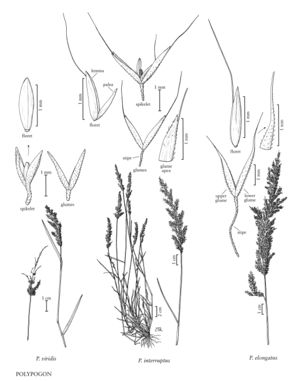Difference between revisions of "Polypogon viridis"
FNA>Volume Importer |
FNA>Volume Importer |
||
| Line 29: | Line 29: | ||
-->{{Treatment/Body | -->{{Treatment/Body | ||
|distribution=Puerto Rico;Colo.;N.Mex.;Tex.;B.C.;N.J.;Va.;Calif.;Pacific Islands (Hawaii);Wyo.;Utah;S.C.;Okla.;Wash.;Ariz.;Oreg.;Nev.;Conn. | |distribution=Puerto Rico;Colo.;N.Mex.;Tex.;B.C.;N.J.;Va.;Calif.;Pacific Islands (Hawaii);Wyo.;Utah;S.C.;Okla.;Wash.;Ariz.;Oreg.;Nev.;Conn. | ||
| − | |discussion=<p | + | |discussion=<p>Polypogon viridis grows in mesic habitats associated with rivers, streams, and irrigation ditches. It is native from southern Europe to Pakistan, but is now established in the Flora region, particularly the southwestern United States. Records from the Atlantic coast are based on plants found on ballast dumps; there have been no recent collections from these locations.</p><!-- |
| − | --><p>In Europe, | + | --><p>In Europe, Polypogon viridis hybridizes with P. monspeliensis, forming P. xadscendens Guss. ex Bertol.; no such hybrids have been reported from the Flora region.</p> |
|tables= | |tables= | ||
|references= | |references= | ||
| Line 46: | Line 46: | ||
|basionyms= | |basionyms= | ||
|family=Poaceae | |family=Poaceae | ||
| + | |illustrator=Cindy Roché | ||
|distribution=Puerto Rico;Colo.;N.Mex.;Tex.;B.C.;N.J.;Va.;Calif.;Pacific Islands (Hawaii);Wyo.;Utah;S.C.;Okla.;Wash.;Ariz.;Oreg.;Nev.;Conn. | |distribution=Puerto Rico;Colo.;N.Mex.;Tex.;B.C.;N.J.;Va.;Calif.;Pacific Islands (Hawaii);Wyo.;Utah;S.C.;Okla.;Wash.;Ariz.;Oreg.;Nev.;Conn. | ||
|reference=None | |reference=None | ||
| Line 51: | Line 52: | ||
|publication year= | |publication year= | ||
|special status= | |special status= | ||
| − | |source xml=https:// | + | |source xml=https://bibilujan@bitbucket.org/aafc-mbb/fna-data-curation.git/src/314eb390f968962f596ae85f506b4b3db8683b1b/coarse_grained_fna_xml/V24/V24_933.xml |
|subfamily=Poaceae subfam. Pooideae | |subfamily=Poaceae subfam. Pooideae | ||
|tribe=Poaceae tribe Poeae | |tribe=Poaceae tribe Poeae | ||
Revision as of 16:10, 30 October 2019
Plants perennial, often flowering the first year. Culms 10-90 cm, sometimes decumbent and rooting at the lower nodes. Sheaths glabrous, smooth; ligules to 5 mm; blades 2-13 cm long, 1-6 mm wide. Panicles 2-10 cm, ovate-oblong to pyramidal, dense but interrupted, pale green to purplish; pedicels not developed; stipes 0.1-0.6 mm. Glumes 1.5-2 mm, scabrous on the back and keel, apices obtuse or truncate, unawned; lemmas about 1 mm, erose, unawned; paleas subequal to the lemmas; anthers 0.3-0.5 mm. 2n = 28, 42.
Distribution
Puerto Rico, Colo., N.Mex., Tex., B.C., N.J., Va., Calif., Pacific Islands (Hawaii), Wyo., Utah, S.C., Okla., Wash., Ariz., Oreg., Nev., Conn.
Discussion
Polypogon viridis grows in mesic habitats associated with rivers, streams, and irrigation ditches. It is native from southern Europe to Pakistan, but is now established in the Flora region, particularly the southwestern United States. Records from the Atlantic coast are based on plants found on ballast dumps; there have been no recent collections from these locations.
In Europe, Polypogon viridis hybridizes with P. monspeliensis, forming P. xadscendens Guss. ex Bertol.; no such hybrids have been reported from the Flora region.
Selected References
None.
